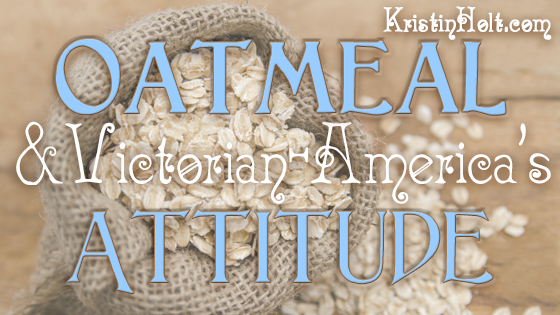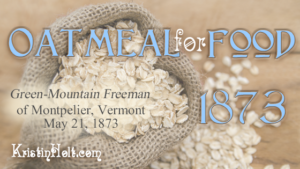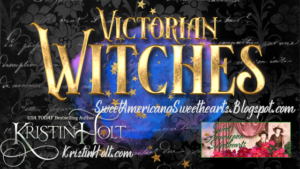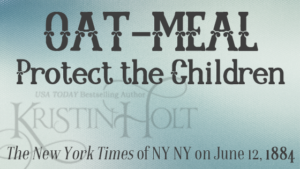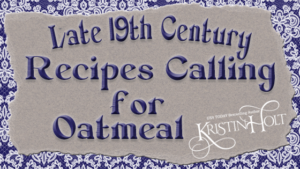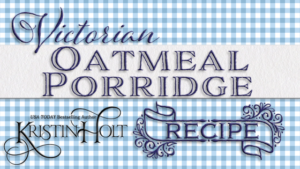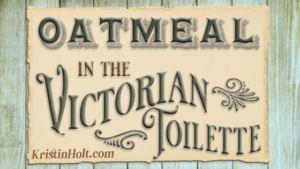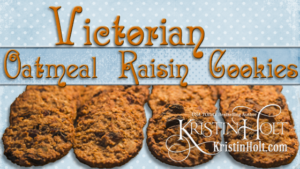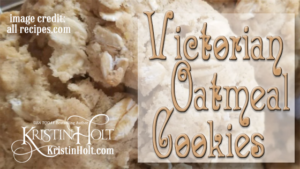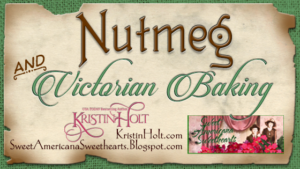Oatmeal and Victorian America’s Attitude
Oatmeal and Victorian America’s Attitude.
Yes, it’s bizarre (because Americans today know recognize oats), but true. Oatmeal had a hard time gaining traction in the Victorian-American kitchen. Oatmeal and Victorian America’s Attitude.
Why? Oatmeal and Victorian America’s Attitude.
As a melting pot from the world over, the nineteenth-century United States held varying attitudes and ideas. Everyone brought personal tastes and parental attitudes along. To many of those folks, oats remained weeds that infested wheat fields and were sometimes grown intentionally as feed for stock. You can take the woman out of the Old Country, but you can’t take the Old Country out of the woman. Get what I’m saying?
Many new Americans put oats solidly in the categories of one: animal fodder, and two: strictly for laborers.
.
Oatmeal is Animal Fodder
Greeks and Romans considered oats to be nothing more than a diseased version of wheat. Oats were a lowly horse food for the Romans, who scoffed at the “oat-eating barbarians”, or those pesky Germanic tribes who eventually toppled the West Roman Empire. Come to think of it, the Romans were never able to conquer the Scots. Big oat eaters, those Scots. Oats 2, Romans 0.
.
.
Oatmeal is for Laborers Only
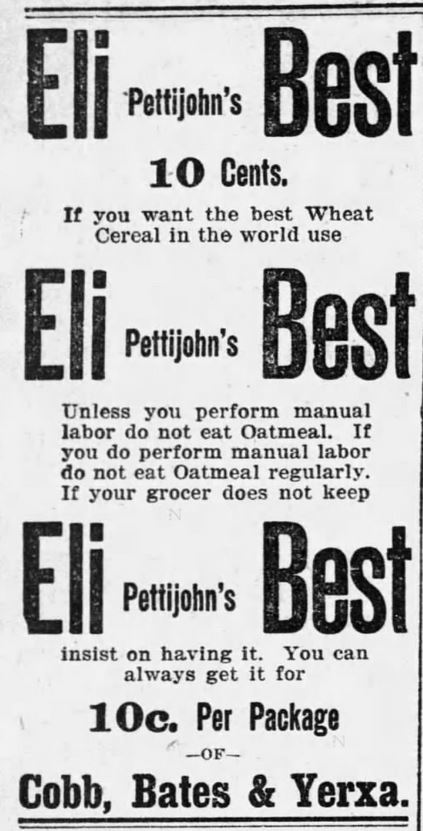
Eli Pettijohn’s Best Wheat Cereal, 10 cents per package. “Unless you perform manual labor do not eat Oatmeal. If you do perform manual labor do not eat Oatmeal regularly.” Advertisement published in The Boston Globe of Boston, Massachusetts. April 25, 1895.
In case you suppose this newspaper article bashing oats as cereal (or food, at all) is only a competitor wanting to sell more wheat cereal. That may well be. But here’s another familiar-sounding message from the nineteenth century:
“To a very great number of people the value of oatmeal is little known; although the prejudice against it, long entertained, as an article of food rather fit for the lower animals than for human beings, has of late, in some measure, given place to a more just opinion, especially among the educated class, who are capable of appreciating the value of the favorable verdict of chemists and physiologists.” (emphasis added)
.
“Oatmeal”, The Idaho World of Idaho City, Idaho on August 22, 1874.
.
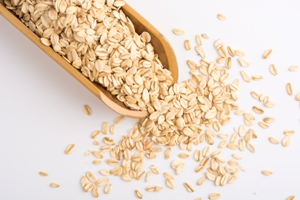
“Oatmeal Is Not Food”
Consider a young housewife happily going about her day. She bakes cookies for her toddlers in between emptying chamber pots and boiling the laundry. She does not want to be categorized as a beast of burden or laborer. Laborers are men without a specific skill. She has been trained every day of her life to become precisely what she is: the Keeper of Happiness at Home. (I’m not being wholly sarcastic here. These were all bright, well-believed and idealized Victorian values. And I adore America’s Victorian era. Too much. Wait? You ask… “Can America have a Victorian era?“)

.
“Oatmeal Is Food”
Did you read my Oatmeal Cookie (without raisins) Article? The popular theory of origin for oatmeal cookies is that the biscuits descended from Scots oat cakes (Bannocks). These soldiers had boosts of energy during battle likely fed the ongoing BAD ATTITUDE. “Oats are only for manual laborers (and somehow not refined enough for anyone but peasants. And horses).” Remember our happy homemaker? Do not call her a peasant. She is queen of her realm.
After all, people said stuff like this:
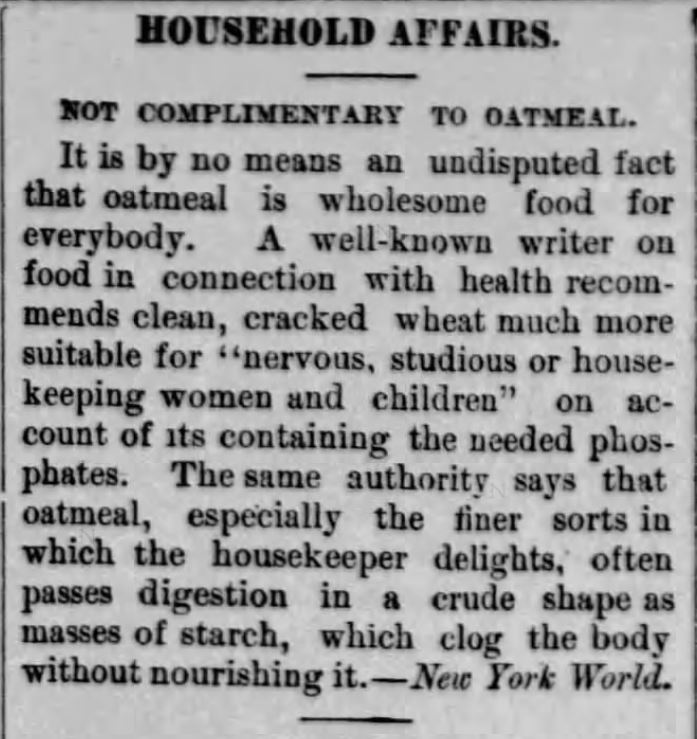
HOUSEHOLD AFFAIRS: NOT COMPLIMENTARY TO OATMEAL. Syndicated from New York World. Published in Springfield Reporter of Springfield, Vermont. February 13, 1891.
Whether nervous, studious, with children or not, every self-respecting new housewife (they all were housewives) was a housekeeper. This World article said so. Females need phosphates from wheat cereal. [Incidentally, other newspaper articles claim oats have abundant phosphates for good health.] And oats–oh, my!–passes digestion in a crude shape as masses of starch! And clog the body without nourishing it.
.
Etiquette Alert
Okay. Not exactly a conversation for polite company.
“But I read it in the newspaper,” exclaims she, “therefore it must be true.” Had to be, doesn’t it? The same Statement of Truth reappeared two weeks later:
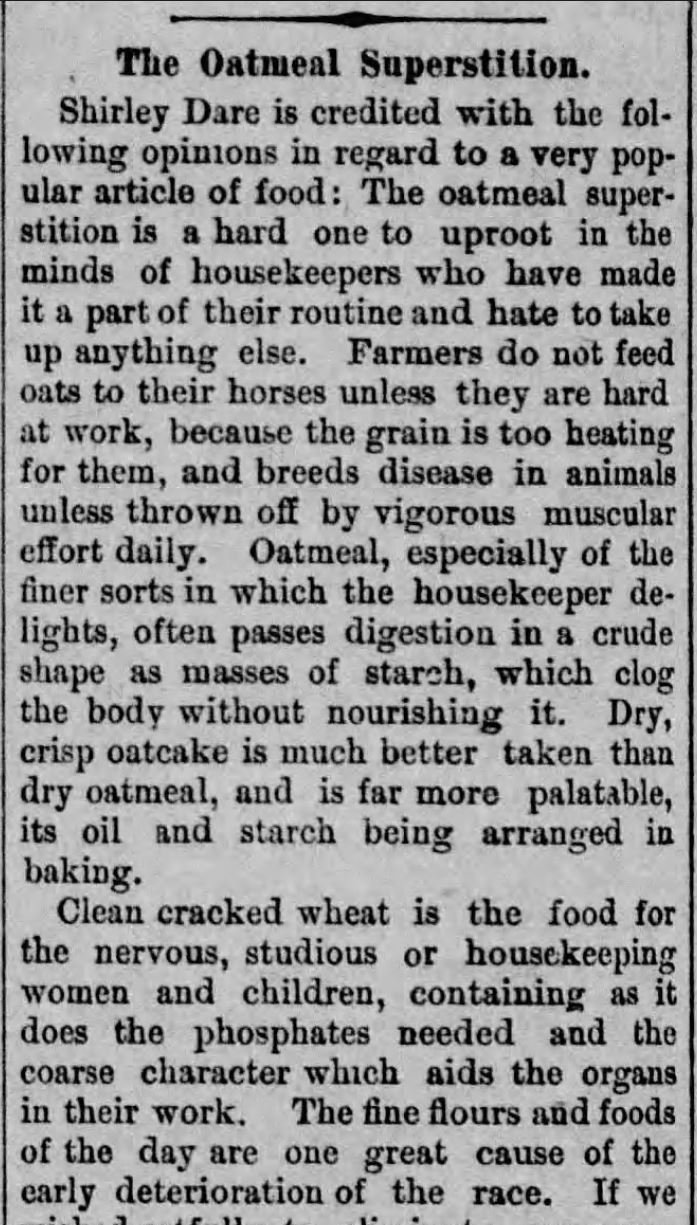
The Oatmeal Superstition (including indigestible), Part 1 of 2, Springfield Reporter of Springfield, Vermont on February 27, 1891.
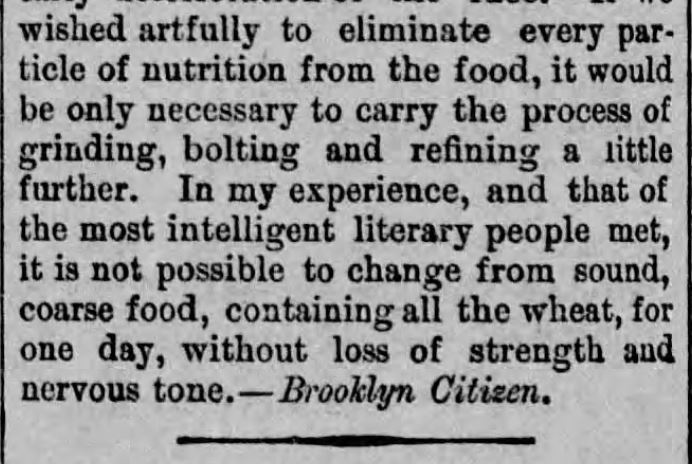
The Oatmeal Superstition (including indigestible), Part 2 of 2, Springfield Reporter of Springfield, Vermont on February 27, 1891.
This one’s confusing, isn’t it? I read the Brooklyn Citizen syndicated article (Springfield Reporter), posted immediately above. Three times.
. Oatmeal and Victorian America’s Attitude
Ultimately, I think they’re saying this:
First, oats are VERY popular among housekeepers.
Second, housekeepers (supposedly) don’t want to give up their oats to try other grains.
Next, farmers don’t feed their horses oats. Unless hard at work, as oats are “a heating food” and otherwise too hard to digest. So that means people shouldn’t eat oats if they’re not working physically hard all day?
Then, that pesky non-truth statement. “Oatmeal, especially of the finer sorts which the housekeeper delights, often passes digestion in a crude shape as masses of starch, which clog the body without nourishing it.”
More opinions: dry, crisp oatcakes are tastier than dry oatmeal because of the magical arrangements of macro-nutrients in the oven’s heat.
Next-to-last: clean cracked wheat is the food for the nervous, studious, or housekeeping women and children, phosphate-rich and all that. Don’t forget, because this is twice now it’s been printed, “…the coarse character which aids the organs in their work.” (Remember scientists hadn’t yet truly discovered what our various organs did, and much guesswork ruled medicine through the nineteenth century).
Finally, the eerily correct foretelling of doomsday associated with processed foods. “The fine flours and foods of the day are one great cause of the early deterioration of the race. If we wished artfully to eliminate every particle of nutrition from the food, it would be only necessary to carry the process of grinding, bolting and refining a little further.”
.
Further Assessment
So… Oatmeal, when not uber processed, is good for you. Unless it’s hot outside. Or you’re sedentary. Or nervous. Then you definitely need wheat cereal. But ensure it’s cracked. And housekeepers of the acquaintance of this unnamed (standard for the era’s newspapers) columnist has far too much fondness for oatmeal and should try some other grain. Preferably wheat. Because the columnist is definitely not nervous. And not a housekeeper. Nor is he an unskilled laborer who exhausts himself in the sun and therefore must consume oatmeal? Or was it must not…?
Where is the superstition the article title promised? What among all this was the superstition? Was it debunked? What is the day’s belief now (uh, then, in 1891)?
I don’t know. But I know the rules about oatmeal varied by whose mouth opened. (Or whose pencil scribbled on that sheet of paper for a news article). See the lengthy article “Oatmeal for Food” from 1873 wherein Oatmeal makes a fine summer drink, “a refreshing beverage for men who are forced to labor in the intense heat of furnaces, &c.” Good for those working in large iron foundries and glass works in Europe. Thus, apparently, it’s okay to add oatmeal to hot work. Even if the person isn’t perspiring from exertion.
Remember all this, will you? The etiquette of it all eludes me.
.

.
Oh, wait. Oatmeal is for Invalids too.
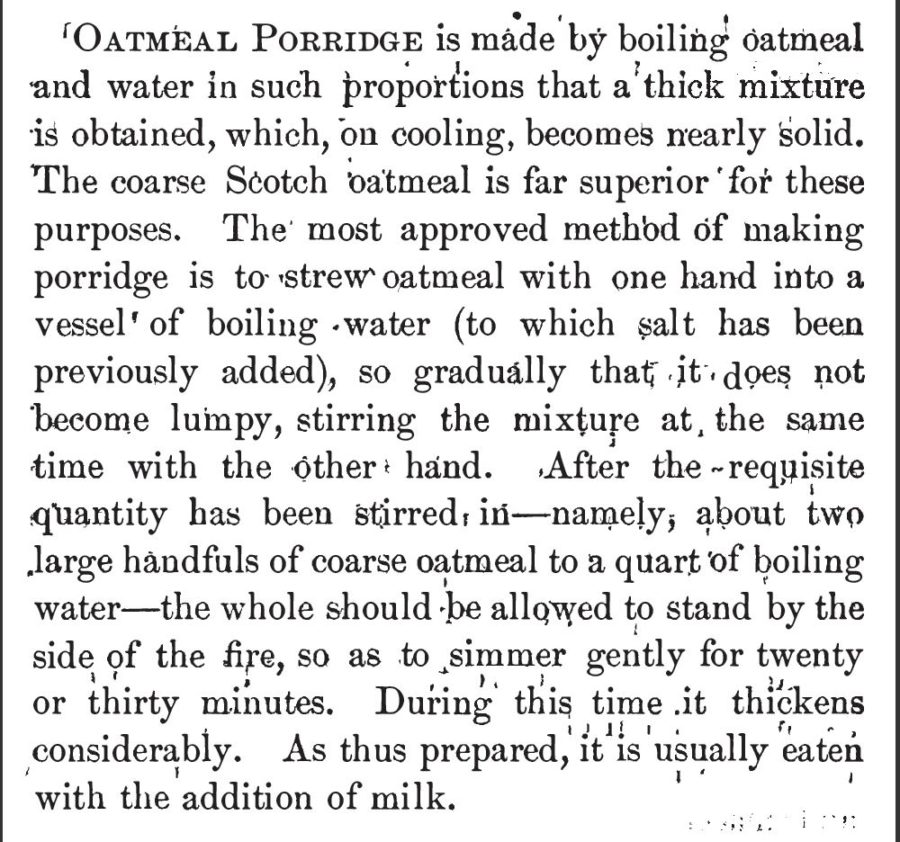
Oatmeal Porridge for Invalids, published in Our New Cook Book and Household Receipts, 1883.
Unless you’re cooking oats the wrong way
The previous article and the following article disagree and both insist they’re right.
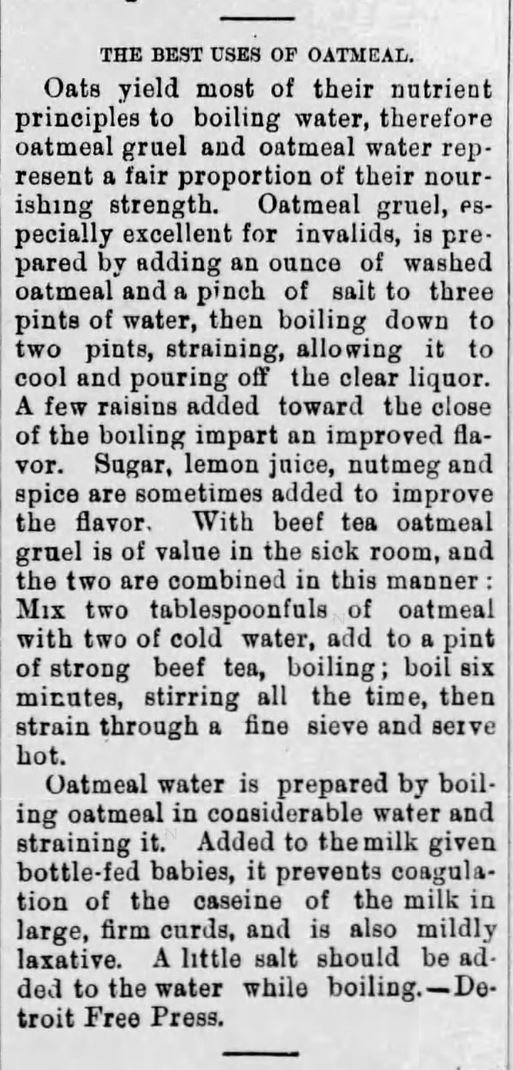
Best Uses of Oatmeal, The Spirit of the Age Newspaper of Woodstock, Vermont on March 20, 1897.
.

What do you think?
As you read these newspaper recipes and snips from vintage cook books, do you reach different conclusions than I?
Have you discovered additional information elsewhere that adds to this dilemma?
Please, scroll down and contribute to the conversation.
Thanks for stopping by!
Oatmeal and Victorian America’s Attitude
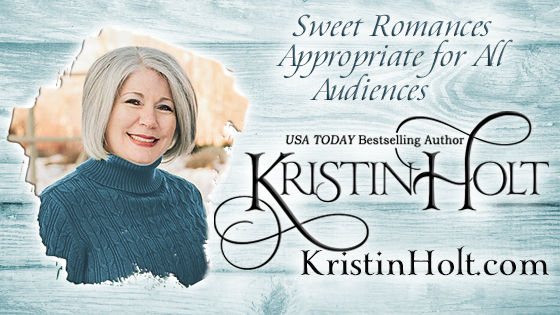
Might you be interested in other articles I’ve written on various history topics? Visit my Archives Page to scroll through, or use the search feature (see the stick-figure magnifying glass).
.
Related Articles
Copyright © 2019 Kristin Holt LC

